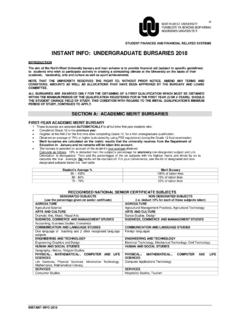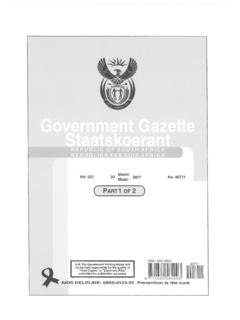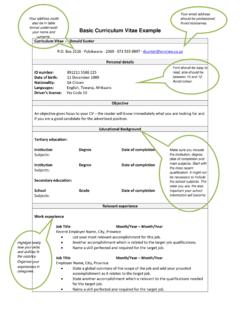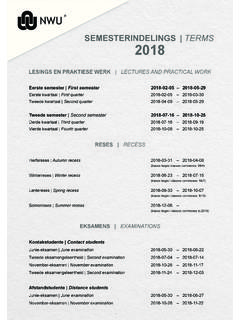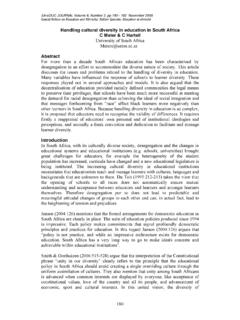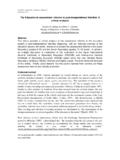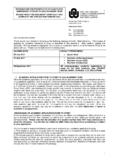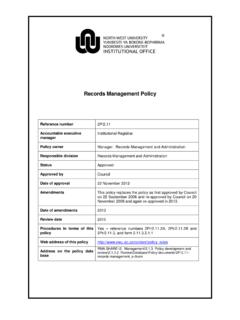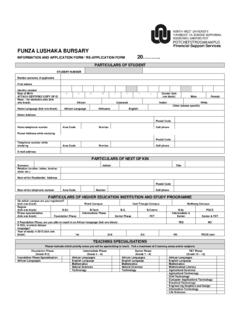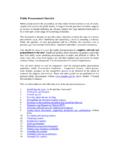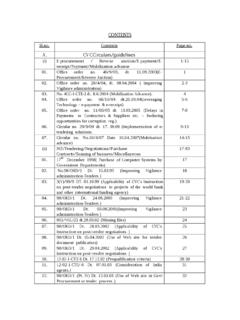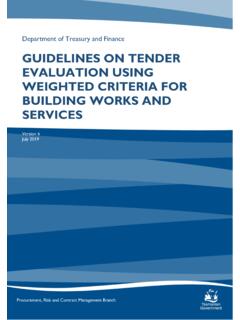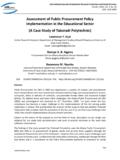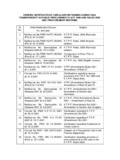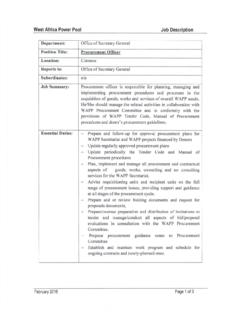Transcription of Author: P Bolton DISQUALIFICATION FOR NON …
1 ISSN 1727-3781 Author: P Bolton DISQUALIFICATION FOR NON- compliance with PUBLIC tender CONDITIONS 2014 VOLUME 17 No 6 P Bolton PER / PELJ 2014(17)6 2314 DISQUALIFICATION FOR NON- compliance with PUBLIC tender CONDITIONS P Bolton * 1 Introduction In public procurement regulation it is a general rule that procuring entities should consider only conforming, compliant or responsive Tenders should comply with all aspects of the invitation to tender and meet any other requirements laid down by the procuring entity in its tender documents. Bidders should, in other words, comply with tender conditions; a failure to do so would defeat the underlying purpose of supplying information to bidders for the preparation of tenders and amount to unfairness if some bidders were allowed to circumvent tender conditions. It is important for bidders to compete on an equal footing. Moreover, they have a legitimate expectation that the procuring entity will comply with its own tender conditions.
2 Requiring bidders to submit responsive, conforming or compliant tenders also promotes objectivity and encourages wide competition in that all bidders are required to tender on the same work and to the same terms and Is compliance with tender conditions however a hard and fast rule? Must a procuring entity, for example, disqualify a tender that is not signed by a bidder, such tender amounting to a non-conforming or non-responsive tender ? Or would the non-signing of the tender amount to what may be termed a mistake and one which the bidder should be allowed to correct? What if a particular bidder submits a copy of a tax clearance certificate and not an original one as stipulated in the tender invitation? Would such an omission amount to a mistake and one which the bidder should be allowed to correct or respond to? What if, furthermore, the price in words in a * Phoebe Bolton .
3 BProc LLB LLM LLD (UWC). Professor of Public procurement Law, Faculty of Law, Stellenbosch University. Email: 1 The term "procuring entities" is used here to refer broadly to government or public entities and for South African purposes specifically those entities that are bound by the procurement clause in s 217 of the Constitution of the Republic of South Africa, 1996 and by relevant procurement laws. 2 See generally Arrowsmith, Linarelli and Wallace Regulating Public procurement 650-673; Cibinic and Nash Formation of Government Contracts 537-592. P Bolton PER / PELJ 2014(17)6 2315 tender and the price in numbers differ? Would such a "clerical'' mistake entitle the relevant bidder to correct the mistake? In other words, where should the line be drawn? Should a procuring entity always enforce strict compliance with tender conditions or does it in some instances exercise discretion to condone mistakes or omissions in a tender ?
4 And if procuring entities do have discretion in this regard, how should such discretion be exercised? What criteria should be applied in the exercise thereof? Can a procuring entity, furthermore, be told by a court of law that it should have exercised its discretion in a particular way, for example by allowing the bidder in question to correct the particular mistake or omission? When may a court interfere in the exercise of the discretionary powers of procuring entities? Given the longstanding uncertainty in practice around the level of compliance with tender conditions required in South African public procurement law, and particularly in view of the most recent Supreme Court of Appeal decision on the matter in Dr JS Moroka Municipality v The Chairperson of the tender Evaluation Committee of the Dr JS Moroka Municipality,3 this paper will be devoted to the subject of compliance with tender conditions.
5 First, attention will be given to the meaning of a conforming / compliant / responsive tender . Reference will first be made to the UNCITRAL Model Law on Public procurement (2011),4 the World Bank procurement Guidelines,5 and United States procurement law. Thereafter, attention will be given to the legal position in South Africa. The international regimes will be considered due to their recognized standing in international law. The UNCITRAL Model Law on Public procurement is a framework law and was adopted as a template for developing and reforming regulatory systems for public procurement . It has proven to be very successful and has formed the basis of procurement law in more than 30 countries across the The World Bank procurement Guidelines will serve as an example of the treatment of "responsiveness" by an international development institution, 3 Dr JS Moroka Municipality v The Chairperson of the tender Evaluation Committee of the Dr JS Moroka Municipality 2013 ZASCA 186 (29 November 2013) (Dr JS Moroka Municipality case).
6 4 UNCITRAL Model Law on Public procurement (2011). 5 World Bank 2011 /0,,contentMDK:20060840~pagePK:84269~piP K:60001558~theSitePK:84266, (World Bank procurement Guidelines). 6 See Arrowsmith and Nicholas "UNCITRAL Model Law on procurement " ch 1. P Bolton PER / PELJ 2014(17)6 2316 and the United States public procurement system is one of the oldest and most advanced systems in the world. Having canvassed the meaning of a conforming / compliant / responsive tender , the paper will continue with a historical overview of the South African courts' treatment of compliance with tender conditions. Comments will then be made on the most recent decision in the DR JS Moroka Municipality case and guidance will be offered on the treatment of compliance with tender conditions in the South African context. 2 The meaning of a conforming / compliant / responsive tender The UNCITRAL Model Law on Public procurement , the World Bank procurement Guidelines and United States procurement law The UNCITRAL Model Law on Public procurement deals with the examination and evaluation of tenders in Article 43, and provides in pertinent part as follows: 1.
7 (a) Subject to subparagraph (b) of this paragraph, the procuring entity shall regard a tender as responsive if it conforms to all requirements set out in the solicitation documents in accordance with article 10 of this Law. (b) The procuring entity may regard a tender as responsive even if it contains minor deviations that do not materially alter or depart from the characteristics, terms, conditions and other requirements set out in the solicitation documents or if it contains errors or oversights that can be corrected without touching on the substance of the tender . Any such deviations shall be quantified, to the extent possible, and appropriately taken account of in the evaluation of tenders. 2. The procuring entity shall reject a tender : (c) If the tender is not responsive. The World Bank procurement Guidelines similarly provide as follows: The Borrower shall ascertain whether the bids (a) meet the eligibility requirements specified in paragraph , , and of these Guidelines, (b) have been properly signed, (c) are accompanied by the required securities or required declaration signed as specified in paragraph of the Guidelines, (d) are substantially responsive to the bidding documents; and (e) are otherwise generally in order.
8 If a bid, including with regard to the required bid security, is not substantially responsive, that is, it contains material deviations from or reservations to the terms, conditions and specifications in the bidding documents, it shall not be considered further. The bidder shall neither be permitted nor invited by the P Bolton PER / PELJ 2014(17)6 2317 Borrower to correct or withdraw material deviations or reservations once bids have been In United States procurement law there are statutory provisions which stipulate that an award must be made to the bidder "whose bid conforms to the solicitation".8 The Federal Acquisition Regulations (US FAR)9 further deal with the "responsiveness of bids",10 and state that: [t]o be considered for award, a bid must comply in all material respects with the invitation for bids. Such compliance enables bidders to stand on an equal footing and maintain the integrity of the sealed bidding Under United States procurement law, therefore, non-responsiveness is also defined in terms of the materiality of the nonconformity.
9 A bid that contains "minor informalities" is not considered non-responsive. A minor informality or irregularity, in turn, is defined as: one that is merely a matter of form and not of substance. It also pertains to some immaterial defect in a bid or variation of a bid from the exact requirements of the invitation that can be corrected or waived without being prejudicial to other bidders. The defect or variation is immaterial when the effect on price, quantity, quality or delivery is negligible when contrasted with the total cost or scope of the supplies or services being acquired. The contracting officer either shall give the bidder an opportunity to cure any deficiency resulting from a minor informality or irregularity in a bid or waive the deficiency, whichever is to the advantage of the The decision as to whether or not a particular nonconformity constitutes a minor deviation or informality under US procurement law has sometimes been characterised as a discretionary one, but at the same time the Comptroller General has in some instances required a waiver and has suggested the award to the 7 Para of the World Bank procurement Guidelines.
10 The Guidelines makes use of the term "bid" as opposed to the term " tender ". These two terms are, however, interchangeable. In the South African context, use is primarily made of the term " tender ", but in some instances government documents also make reference to the term "bid". 8 10 USC 2305(b)(3); 41 USC 253(c)(c). 9 United States 2014 (US FAR). 10 The term "responsiveness" should not be confused with the term "responsibility" as used in United States procurement law. For more on this, see Cibinic and Nash Formation of Government Contracts 545-553. 11 US FAR (a). 12 US FAR Also see the rest of the Regulation for examples of minor informalities or irregularities. P Bolton PER / PELJ 2014(17)6 2318 aggrieved bidder even though the procuring entity 'in its discretion' had refused to waive the The Comptroller has also in a number of cases focused on the prejudice to other bidders rather than on the degree of nonconformity in determining if a bid is nonresponsive.
